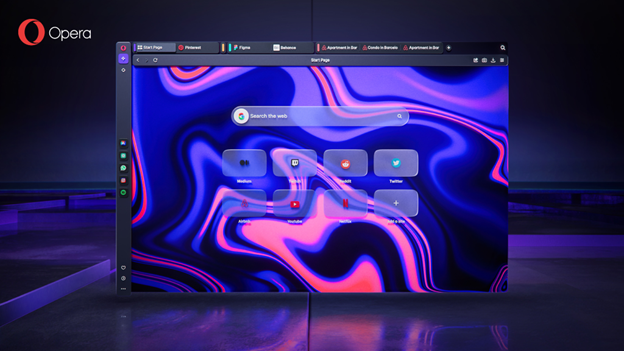Opera One: Groundbreaking design, award-winning aesthetics

Opera, the original pioneer of so many of the features that are now standard across all browsers, dares to do what competitors will not. And when it came time for the 100th version of the flagship desktop browser, no mere facelift would suffice. The product team completely reimagined the browsing experience, resulting in Opera One. Having already won the 2024 iF Design Award Opera One is a case study in how an overhauled browser concept, architecture, and design can yield both user-centric functionality and elegant aesthetics.
When it launched in May of 2023, Opera One became the company’s first browser to incorporate the principles of Modular Design. This new design philosophy was envisioned to allow Opera to continuously iterate an ever-more powerful and feature-rich browser – and one that’s built around AI as its core functionality.
From the start, Opera’s product team sought to reimagine and redesign our flagship browser from the ground up to make AI central to Opera One, rather than an appendage. The result: Aria, Opera’s own native browser AI. Integrated into the browser itself – with access either through the sidebar or a command line – Aria is a leading GPT-based solution with real-time data from around the web. Aria can offer, among other features, intelligent recommendations, article summaries, coding solutions, and product support – it can even be trained to write content for users in their own style. Between its ability to learn from preferences and its intuitive integration into the browser, Aria makes it easy for users to boost their creativity and productivity through the power of AI.
The Modular Design principles required a whole new browser architecture. Opera One was rebuilt using a multithreaded compositor, which enables complex graphic operations in the UI without disruptions from background processes. This new browser architecture was able to breathe life into the user interface like never before, which is particularly visible in new features like Tab Islands.
Tab Islands enables Opera One to tackle an often messy aspect of the online experience: tab management. Too many open tabs can often make users feel overwhelmed, but Opera One’s Tab Islands addresses this by reacting, based on context, to the user: tabs are grouped according to theme as they are opened, without disrupting the user's workflow. Tab Islands can be expanded or collapsed, and users can move tabs in and out of islands at will. The islands present distinctly within the user interface, marked by unique colors and clear borders. The cluttered nature of tabs squished together at the top of one’s screen is thus transformed into a series of logical groups, initially organized automatically, but easily rearranged at the user’s discretion.
Opera One and Aria have made waves in the browser world since early 2023. The browser AI attracted over 1 million users in the first three months, and Opera One was recently distinguished with the 2024 iF Design Award. From the browser’s core architecture to its beautiful UI, Aria to Tab Islands – Opera One stands out among browsers, redefining how users engage with the web.
Opera is poised to further augment its AI capabilities, having recently made a significant investment in a new AI cluster in Iceland; featuring an NVIDIA DGX SuperPOD and powered entirely by green energy, the center will form the base of the company’s future AI services. New, experimental AI features are already coming to Opera One’s developer stream via the AI Feature Drops initiative, which gives users early access to innovations without the need for additional paid services or extensions. Most recently, Opera became the first major browser to support over 150 Large Language Models (LLMs) from approximately 50 families of models, enabling users to further safeguard their privacy while harnessing the AI tool of their choice.


